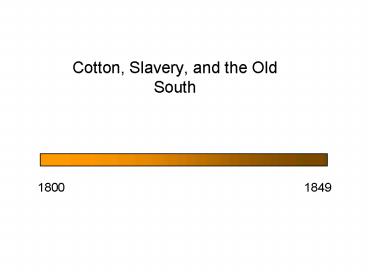Cotton, Slavery, and the Old South - PowerPoint PPT Presentation
1 / 32
Title:
Cotton, Slavery, and the Old South
Description:
... He became pastor of the 1st Baptist Church in Charleston, South Carolina, ... ``In all social systems there must be a class to do the menial duties, ... – PowerPoint PPT presentation
Number of Views:205
Avg rating:3.0/5.0
Title: Cotton, Slavery, and the Old South
1
- Cotton, Slavery, and the Old South
2
- MAIN THEMES
- What was conditional anti-slavery.
- How did slavery survive the end of the slave
trade? - How the staple crop economy helped the South
develop a unique culture. - The characteristic differences between the South
and the North. - The nature of the "peculiar institution" of
slavery, and the effect it had on both whites and
blacks.
3
(No Transcript)
4
(No Transcript)
5
(No Transcript)
6
SERVILE INSURRECTION 1791 - 1804 HAITIAN
REVOLUTION 1799 -1800 GABRIEL POSSERS
REVOLT (VIRGINIA) 1821 DENMARK VESEYS
REVOLT (CHARLESTON) 1831 NAT TURNERS
REBELLION 1859 - HARPER'S FERRY INSURRECTION
1861-1865 - SECOND AMERICAN REVOLUTION
7
- The Cotton Economy
- The Rise of King Cotton
- Southern Trade and Industry
- Upper South
- Primitive Banking
- Lack of Transportation
- Sources of Southern Difference
- Agriculture Vs. Industry
- Codes of honor and dueling
- Their special way of life (slavery)
8
(No Transcript)
9
Southern White Society
- The Planter Class
- Small portion of population
- Dominant portion of population
- Image conscious
- The Plain Folk
- Yeoman Farmer
- Illiteracy
- Lack of slave labor
10
Southern White Society
- Southern Honor
- Social Status vs. Individual Virtue
- Place of violence in Southern society (slavery)
- Duels for equals and lynching for inferiors.
11
- The Peculiar Institution
- Slavery in the Cities
- Lack of European Immigrants in South
- Skilled Slaves
- Female Dominance
- Free Blacks
- Manumission Laws
- Poverty
12
Debating the Past Extra THE ORIGIN OF SLAVERY
- 1918 Ulrich B. Philips, American Negro Slavery
- 1959 Stanley Elkins, Slavery, A Problem in
American Institutional and Intellectual Life - 1976 Herbert Gutman, The Black Family in Slavery
and Freedom - 1975 Eugene Genovese, Roll Jordon Roll
- 1984 Robert Fogel and Stanely Engerman, Time on
the Cross
13
Debating the Past THE CHARACTER OF SLAVERY
- 1966 David B. Davis, The Problem of Slavery in
Western Culture - 1968 Winthrop D. Jordan,
- White Over Black American Attitudes Toward the
Negro, 1550-1812
14
(No Transcript)
15
(No Transcript)
16
MAJOR ABOLITIONISTS DAVID WALKER (1796
1830) WILLIAM LLOYD GARRISON (1805-1879) ARTHUR
AND LEWIS TAPPEN FREDERICK DOUGLASS
(1818-1895) HARRIET BEECHER STOWE
(1811-1896) JOHN BROWN (1800-1859)
17
DAVID WALKERS APPEAL
- MORAL HYPOCRICY AND THE AMERICAN CHARACTURE
- CLASSICAL EDUCATION
- ANTI-PASSIVIST / GARRISONIAN (GOD OF ARMIES)
- ANTI-CATHOLIC (P.21)
18
- DAVID WALKERS APPEAL (Cont)
- Article I
- Wretchedness in consequence of slavery
- Slaveholders worse than Egyptians and Moslems
- Jeffersonian critique of Jefferson
-
Article II - Wretchedness in consequence of ignorance
- Education is emancipation
- African American critique of African Americans
Resignation, servility, and slavery - No neutrality for African Americans
- Example of Hayti
19
- DAVID WALKERS APPEAL (Cont)
- Article III
- Wretchedness in consequence of Christians
- Christian critique of Christianity
- Absurdity of missionaries
- Anti-slavery cannot compared to other reforms
- Bartholomew Las Casas
- Article IV
- Wretchedness in consequence of colonialism
- Native land
- Henry Clay
- Richard Allen
20
WILLIAM LLOYD GARRISON (1805-1879)
"I do not wish to think, or speak, or write, with
moderation. . . . I am in earnest -- I will not
equivocate -- I will not excuse -- I will not
retreat a single inch -- AND I WILL BE
HEARD. First issue of the Liberator (1831)
21
Arthur Tappan (1786-1865
Lewis Tappan (1828-1873)
22
FREDERICK DOUGLASS (1818-1895)
23
HARRIET BEECHER STOWE (1811-1896)
Uncle Tom's Cabin (1852)
24
JOHN BROWN (1800-1859)
Here before God, in the presence of these
witnesses, I consecrate my life to the
destruction of slavery. 1837, Memorial
Service for Elijah Lovejoy
25
APOLOGISTS OF SLAVERY 1. SCIENTIFIC DEFENSE
Zephaniah Kingsley (1765-1843) 2. RELIGIOUS
DEFENSE Rev. Dr. Richard Furman
(1755-1825) CURSE OF HAM 3. SOCIAL DEFENSE
George Fitzhugh (1806-81) Edmund Ruffin
(1794-1865) 4. POLITICAL DEFENSE James Henry
Hammond (18071864) John C. Calhoun (1782-1850)
26
Zephaniah Kingsley (1765-1843)
A Treatise on the Patriarchal, or
Cooperative System of Society, 1828
Kingsley Plantation
27
Rev. Dr. Richard Furman (1755-1825).
EXPOSITION of The Views of the Baptists,
RELATIVE TO THE COLOURED POPULATION in the
United States IN A COMMUNICATION To the
Governor of South-Carolina
28
CURSE OF HAM Genesis 918-25
29
Fitzhugh, George, 1806-1881 Sociology
for the South (1854) Cannibals All! (1857)
30
Edmund Ruffin, 1794-1865
Agricultural, Geological, and Descriptive
Sketches of Lower North Carolina, and the Similar
Adjacent Lands (1861).
31
James Henry Hammond (18071864)
The 'Mudsill' Theory (1858)
32
John C. Calhouns Concurrent Majority
1832 Nullification Controversy 1836 /
1840 / 1844 Gag Rule / Hammond / Adams 1863
Disquisition on Governments































